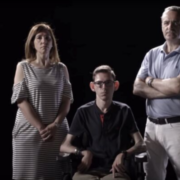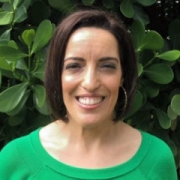Meet Farida Bedwei: Superhero and Software Engineer
Farida Bedwei may have Cerebral Palsy (CP) but she has never let it define what she is, and is not, capable of achieving.
The highly successful entrepreneur and software engineer has brought hope to people living with CP and their families through her powerful fictional protagonists, Karmzah and Zaara.
Karmzah is the phenomenal female comic super hero with CP that Farida launched on World CP Day in 2018.
“I created Karmzah because I found there was no representation of me – a female with Cerebral Palsy – in the world of superheroes,” says Farida.
“And there are millions of little girls and boys who deserve to read a comic or watch an animation and see someone they can relate to.”
Farida partnered with Leti Arts – a Ghanaian digital comic production company – to bring Karmzah to life. The character was so well received that people all over the World quickly sprung to action in the Twitter-sphere, spreading the word that the feisty new superhero had arrived.
“It got tweeted all over the World by various CP and other disability groups, as well as individuals with and without disabilities who were tickled by the concept,” she says.
Karmzah is not the only character with CP that Farida has given life
In 2010, Farida published Definition of a Miracle, a children’s book starring a young African girl with CP named Zaara.
“The story about Zaara is a bit more personal for me, I went through similar experiences growing up here in Ghana,” Farida says.
“Disability is still largely misunderstood and a bit of a taboo in various parts of Ghana and other African countries,” says Farida.
“I wrote Definition of a Miracle to attempt to educate people about disability from the perspective of someone living with it,” she says.
Farida tells us that the impact of publishing this book was huge, hurtling her into the limelight.
“So many mothers of children with CP and other disabilities reached out, telling me I had given them hope,” she says.
On the journey to becoming a Software Engineer
But well before she was creating fictional characters to educate the World about living with CP, Farida was a successful software engineer and entrepreneur.
“My path was defined by my mother’s ingenuity rather than by medical professionals who probably would have used textbook references to determine my capabilities, thus limiting me,” she says.
Farida was home-schooled and learned to read fast because of the one-on-one attention from her mother.
“Growing up, I knew I had limitations, but I was taught to try and surmount them,” says Farida.
“From an early age my mum told me to remove the words “I can’t” from my vocabulary and replace them with “I’ll try”,” says Farida.
“That was so ingrained in my subconscious that I never thought anything was beyond me,” she says.
“I think when you have CP or any other disability, you learn to be resilient and adaptive to whatever situation you find yourself in.”
At age 12, she entered mainstream educated and attended a junior high school for three years until the terrain of Ghana’s high schools – unfriendly for people with disabilities – prevented her from continuing.
Instead, she completed a Diploma in Information Systems and started working part-time while completing a higher diploma.
“Then I got my dream job as a junior programmer in the leading software development company of the time – that was the start of my career,” says Farida.
“As much as possible, I did not let CP limit me. I played to my strengths. From an early age it was determined that I had above average intelligence and a knack for computers, so I channelled my energies into a career in computing.
“My education was somewhat unconventional because I lived in a country without inclusive schools, but we made it work,” she says.
“At the end of the day, I was educated enough to get an entry-level job in the software industry and from then onwards I learned on the job, completed another diploma and went on to get a Degree in Computer Science.”
Farida recounts that when she started her career, there weren’t many candidates for software development roles.
“I had employers who were willing to look beyond the physical disability and give me an opportunity to prove myself,” she says.
And she certainly went on to prove herself unstoppable.
The entrepreneurial adventure
“I never set out to become an entrepreneur,” Farida declares.
“After working in the software industry for over a decade, I moved on to the micro-banking industry,” she says.
It was while in the micro-banking Industry that Farida built a cloud banking application, drawing on the expert knowledge of her now company co-founder, Derrick Dankyi.
The application – Zigloi – simplified the operations of the institution Farida worked for so much that a phenomenal amount of growth was able to be achieved in a small timeframe.
Then everyone wanted a bite of the cherry.
Their remarkable success put the dynamic duo in hot demand with other micro-banking institutions. So, they started an IT company called Logiciel and began delivering services across the micro-banking industry.
Farida’s advice for young people living with CP
Farida largely attributes her success in life to her mother’s ingenuity and growing up in a developing country where there were inadequate facilities for children with disabilities.
But her magic potion seems to be all in her acceptance of who she is and harnessing her capabilities without focussing on her disabilities.
“Accept and love yourself for who you are,” says Farida.
“Don’t waste your time wishing you didn’t have this condition. Rather, find ways to attain greater heights with your disabilities,” she says.
“Don’t let professionals decide what your capabilities are – discover them yourself.
“Always believe in yourself and if you are a person on faith, always believe in your God.”
You can find copies of Farida’s story book, Definition of a Miracle, on Amazon.
The Karmzah comic is available on Amazon and the Afrocomix app on the Google Play Store.







